Thursday August 9 2019 was the second day of PyCon Africa in Accra. About 17 talks were delivered, including two keynotes. Below you’ll find a quick summary of the talks I attended. The pictures in the post aren’t great because they were either taken from a bad angle or using a smartphone. I’ll update this once better pictures are made available.
PyCon Africa got off to a very good start in my opinion. The attendance is good and the talks are solid. In this post I’ll go over the talks that I attended and also mention some of the people I met today.
The first talk was a Keynote address by Moustapha Cisse who is the Head of Google AI Center Accra. Moustapha discussed how he and his team use AI at Google to solve challenging problems. In his talk, Moustapha, covered how Google uses AI and information gathered from satellite images to infer and gather statistics, for flood forecasting, and disease prevention.
The last part of the talk was on ethics in AI.
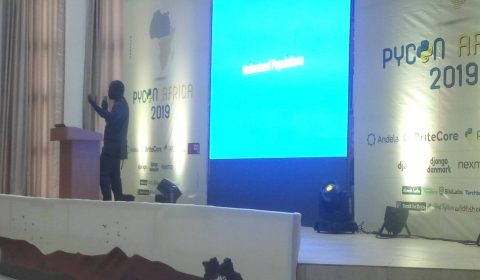
After the keynote Meili Triantafyllidi, gave a talk entitled “Lessons learned from 6 years in Pyladies Berlin”. In her talk, she discussed everything she has learned from running a Pyladies chapter in Berlin, Germany.
Meili talked about how to improve public speaking skills, lead a community, get speakers for events and shared general principles to follow when running a tech event in order to make it accessible and inclusive. I enjoy topics about diversity and inclusion and this was the biggest take away from Meili’s talk:
Assume everyone you’re coaching has zero knowledge but infinite intelligence.
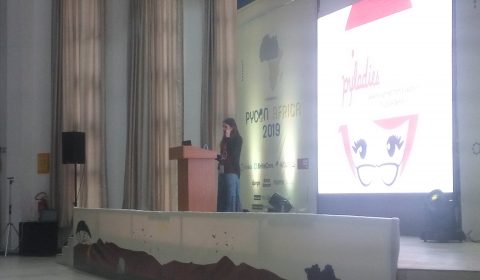
After the lunch break, I attended the “Web Virtual Reality and A-frame” talk by Candy Tricia Khohliwe, a Mozilla Tech Speaker. Candy talked about virtual reality and showcased how to use A-frame to create WebVR components.
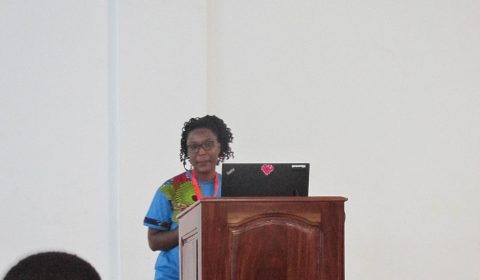
Next was Nicholas Del Grosso with “Unraveling the Spaghetti: Tips for Refactoring Your Code”. Nicholas used a simple example to illustrate how projects get messy over time and how they can be refactored safely. The talk gave easy to follow guidelines on how to identify and fix code smells.
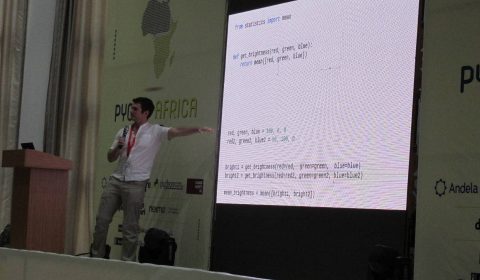
After Nick’s talk, I went to Kelvin Oyana’s talk about “Bridging the talent gap between Python communities and industry”. This talk was one of the highlights of today’s talks for me. Kelvin discussed challenges that come with developing and hiring talent. He pointed out some pain points developers face when looking for jobs and also talked about why businesses either don’t like hiring or training juniors.
Kelvin outlined practical steps that can be taken by both tech communities and businesses to strike some sort of balance.
The talk that came after Kelvin’s was by Daniele Procida on “The world’s cheapest, simplest plotter”. Daniele in his talk showed how he built a plotter for under US$ 20 using a raspberry pi, 3 motors and readily available materials like a pen and cardboard. The plotter has a Python program that controls it and the way it works is that you feed this program an image and it vectorizes it, converts that information into coordinate data and then plots the image onto a paper.
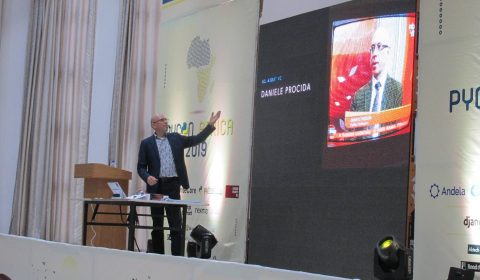
Daniele gave a live demonstration of the plotter and made a cost breakdown for all the materials and software required to build it. The audience(myself included) really enjoyed the talk.
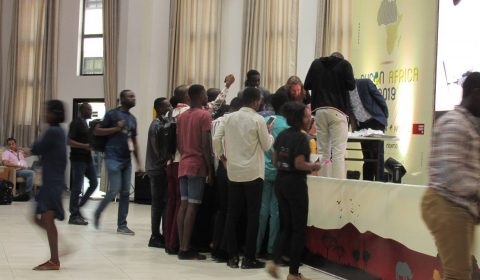
The next talk I attended was entitled “Is this Python thing really working?” by Jessica Upani Jessica discussed the different Python communities in Africa, gave the history of PyCons in the region and also touched on the problems and challenges faced by African communities in general and Namibia in particular.
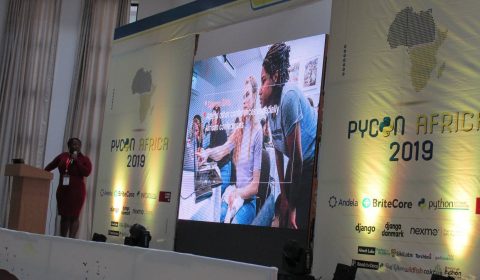
There was a panel discussion later in the evening and the four diamond sponsors of Pycon Africa, The Python Software Foundation(PSF), the Django UK Society, BriteCore, and Andela fielded questions about the role of African developers in the global tech space. Daniel Roy Greenfeld, the author of Two Scoops of Django and VP of Implementation Engineering at BriteCore shared a statistic about the number of engineers they currently have that are from Africa. I can’t remember the exact number but it was impressive.
The last talk of the day was a keynote by Anna Makarudze, VP of the Django Software Foundation on “What the African developer can do to increase Diversity in tech.”. Anna discussed what organisations can do to be more diverse. She mentioned things such as hiring diversity advocates, providing mentorship opportunities and offering financial aid. Anna’s talk didn’t focus only on what organisations can do but also touched on what individual underrepresented people in tech can do to increase the diversity in tech.
Unfortunately those are the only talks I attended on the first day, I spent the rest of the time in the Hallway Track meeting and talking to people. If you notice problems in the spelling and grammar in this post, I apologise, it is 1:30 AM and I’m tired and sleepy.